Overview of Dragons Den Pitch – Sami
Posted by Samantha Kanza in Overview of Pitch to Dragons Den Panel on April 24, 2014
This post details an overview of the preparation for the Dragons Den pitch.
The pitch will begin with an introduction to the project and the team, and then progress immediately onto a showing of the video.
Once the video has been shown the following items will be discussed in the pitch:
USP’s
This portion will detail the USP’s of Koh.Tu.Me:
- Inclusive: Koh.Tu.Me aims to bring everyone together, irrespective of whether you are on a social network or not, and if you are actually a member of Koh.Tu.Me or not.
- Intelligent Travel Organiser: Koh.Tu.Me contains an intelligent travel organiser that not only aims to get you from your location to the event location, but is centered around organising the best travel options for the group!
- Unique Combination: We have looked at over 40 different event and travel applications, and none of them combine the service of Koh.Tu.Me.
- Open Data Centric: The travel data that Koh.Tu.Me uses will all be taken from different Open Data sets.
- Targeted Event Advertising: Koh.Tu.Me is event centric, and therefore all advertising within the application will be aimed providing relevant adverts to the event you are attending.
Application Dev
This portion will provide detail about the application itself, initially by displaying an architecture diagram. Then it will be explained that it will be implemented by creating a responsive web app, that will then be ported to a mobile application, such that there will be a desktop site, a mobile site, and a mobile app to download depending on the users preference.
Survey Results
This section will look at the results from the survey ran to ascertain the popularity of the different features of Koh.Tu.Me. The survey produced some very positive results, with each ‘feature’ taking the majority vote as appealing.
Revenue
This section will detail how the initial version of Koh.Tu.Me will look to make money. This will be in three ways:
- Targeted Event Advertising: Koh.Tu.Me will provide targeted advertising related to the event information. For example events that include a meal out at a restaurant would show offers or adverts for restaurants in that chain, or in that area, or in that cuisine.
- Taxi Referrals/Promotions: Koh.Tu.Me will be approaching taxi companies to ask them to consider paying to promote their taxi firm within our application, and Koh.Tu.Me would take a small booking referral for taxi’s booked through our application. Additionally/Alternatively they could pay a fixed rate to promote their company within our application. These companies could potentially be enticed in with trial offers.
- Non Advert Purchasable App: There will also be a purchasable app that doesn’t include advertising for those who prefer this option.
Future
Once the app has gained in both users and popularity we can introduce premium accounts and extra services. This will also give us more scope to pitch to more companies for booking referrals and promotion within our application.
Summary
The pitch will end with a summary of Koh.Tu.Me and will then break for questions.
Advertising Video – Sami
Posted by Samantha Kanza in Overview of Pitch to Dragons Den Panel, Uncategorized, Video of Software in Action on April 23, 2014
This is the initial advertising video prepared for the pitch. It was created using drawings that were all put together to run as a video, so that different soundtracks could be recorded behind it.
We are still currently experimenting with different voice overs for the Dragons Den pitch, but this is the preliminary cut.
Application Refined Version 5.0 – Sami
Posted by Samantha Kanza in Mockups and Ideas on April 22, 2014
This blog will make clear which elements of our application will be included from the outset, and which elements are future considerations:
Building on the previous post Application Refined Version 4.0 – Sami which focused on the features of our initial application, this post will look at how the initial application of Koh.Tu.Me will be used to make money.
Our initial application will make money in the following ways:
- Free app with advertising revenue.
- Booking referrals (from taxi companies).
- Purchased app with no advertising.
Once our app gains popularity and users then we could progress to these methods:
- Premium business service.
- In app purchases.
- Ticket purchases within the application, with booking referrals.
Therefore to summarise, our initial version of Koh.Tu.Me will be focused on the social, purely built on Open Data, with minimal setup costs and complexities. The main complexity will be associated with handling the different types of Open Data that need to be correlated for the travel organisational element.
SPARQL & Pseudo Code Example – Sami
Posted by Samantha Kanza in Tech demos and code snippets on April 21, 2014
One of the technologies that Koh.Tu.Me will use is SPARQL [1] which is the query language of the Semantic Web. The University of Southampton has made a lot of Open Data available [2] and have set up a SPARQL Endpoint [3] in order to facilitate easy querying of this data.
This images below illustrates a SPARQL query that can be used to get the bus route and bus stops information, complete with name and latitude and longitude information. This means that if a user requested to travel by bus and put in their location details then this information could be used to locate the bus stop closest to their location, ascertain which bus routes that was on, and then locate which stop on one of those routes was closest to their start location.
The pseudo code would look something like this:
#in the case the user selects bus
select case: “bus”
Stop dest_stop = nearestStopFromCoordinates(dest_lat,dest_long);
List<Route> dest_routes = routeFromStop(dest_lat,dest_long);
Stop start_stop = nearestStopFromCoordinates(user_lat,user_long,dest_routes);
Route bus_route = locate_root(start_stop, dest_stop);
#works out the nearest bus stop from any route to the lat/long provided
nearestStopFromCoordinates(String lat, String long){};
#works out the nearest bus stop on the routes provided, using the lat/long provided
nearestStopFromCoordinates(String lat, String long, List<Route> routes){};
#works out which bus route has both of these stops on
locate_root(Stop start_stop, Stop end_stop);
SPARQL Query
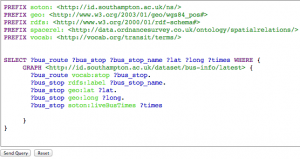
References
[1] http://www.w3.org/TR/sparql11-query/
[2] http://data.southampton.ac.uk/
[3] http://sparql.data.southampton.ac.uk/
Standards & Protocols Overview – Jokha & Sami
Posted by Samantha Kanza in Overview of Standards and Protocols, Tech demos and code snippets on April 19, 2014
This post will discuss the different standards and protocols our social networking application will use.
Open Data Standards
As discussed in the previous post [1] Koh.Tu.Me will be using Open Data for it’s travel and weather data. A majority of Open Data is provided using Open data formats such as XML [2], JSON [3] or RDF [4] (for linked Open Data as is used in data.southampton.ac.uk). Linked Open Data uses URI’s (Unique Resource Identifiers) to identify each of their objects uniquely. This can be used to link together different open data sets.
Open Data can also be provided via an API (for data that changes regularly and will be queried on the fly), and some of the travel data sets looked at in our previous blog post [1] did indeed provide API’s. Additionally some of the data is just provided as a downloadable dump, for data such as postcodes which aren’t going to change on a daily basis.
Open Data Protocol
OData [5] is an Open Data Access Protocol which was built for the primary purpose of creating and accessing data API’s. It’s built on core internet protocols like HTTP and it uses the REST [6] Methodology. This could be used to access the Open Data API’s that Koh.Tu.Me would use to access the travel and weather data.
The weather data API [7] is available in various formats (JSON, XML & HTML) and can provide finely granulated data for precise locations. This level of data detail, in the real time format we wish to process it requires fast and easy access to the data API’s. Which this protocol can facilitate.
SPARQL
SPARQL [8] is the query language for the Semantic Web. It is used to query RDF (linked) data. As discussed in the previous blog post [1] some of the Open Data our social networking application will be using is Linked Data. Therefore we would use this query language to obtain our desired results from the Open Linked Data. A SPARQL Endpoint is required to allow users to query the data, and once that endpoint has been set up that query still needs to be sent from the web/mobile application. The Electronics and Computer Science School at Southampton University has created a tool to query SPARQL using PHP called Graphite [9]. For the Web version of our Koh.Tu.Me application, this could be used.
Yahoo! Query Language (YQL)
From a single interface developers can both query and filter data from any data source, or from web services such as Yahoo, Weather data, or Facebook. The query language is similar to SQL in syntax, and the open data tables are expressed as XML files and therefore can be mapped into our application, and manipulated as needed. YQL would also allow us to store our data in the Yahoo Sherpa cloud storage (we would not use this for users data, but potentially weather data for instance). There are also community open data tables, encouraging developers to share their open data tables with each other. Below is a picture illustrating obtaining gaining a weather forecast for a specific destination [10]:
JQuery, AJAX & JSON
As mentioned above some of the data retrieved from the various API’s will be in JSON format. JSON stands for Javascript Object Notation. JQuery [11] is a javascript library that provides methods such as instant API data retrieval and easy JSON manipulation. This library would be used to query the API’s using AJAX [12] to provide a synchronous on the fly connection over HTTP.
References
[1] Open Data Within Our Application
[2] http://www.w3.org/XML/
[3] http://www.json.org/
[4] http://www.w3.org/RDF/
[5] http://www.odata.org/
[6] http://www.infoq.com/articles/rest-introduction
[7] http://openweathermap.org/
[8] http://www.w3.org/TR/rdf-sparql-query/
[9] http://graphite.ecs.soton.ac.uk/sparqllib/
[10] https://www.datatables.org/
[11] https://api.jquery.com/
[12] https://api.jquery.com/jQuery.ajax/
Open Data within our Application – Someah & Jokha & Sami
Posted by Samantha Kanza in Overview of Standards and Protocols on April 18, 2014
There will be a multitude of different travel data used within our application. When a user accepts an event invitation they will be offered the option to choose their desired method of travel. This can be walking, bus, train, taxi, aeroplane. Koh.Tu.Me will provide suggestions for these different types of travel, complete with the time taken to use this method, prices, locations (e.g bus stops), and people in a close vicinity they can share travel with. In addition to this Koh.Tu.Me will also be using weather data to provide the weather forecast element of the application.
Koh.Tu.Me will be looking to use Open Data as much as possible because this is data that is freely available for anybody to use under an Open Government License [1]. This post will be looking at the different types of travel data we need to use. As Koh.Tu.Me is being created in Southampton by Southampton University Students then potentially a Southampton prototype could be created first to test out the application. This post will be looking at travel data specifically in Southampton, and also for the rest of the UK. Following this, this post will then touch on travel difficulties in different countries, and weather forecast information.
Busses
There are a number of different bus companies in Southampton. UniLink runs the connecting services between all of the University Campus’s and Halls of Residences’s, as well as to both Train Stations and the Airport. BlueStar operates other bus services outside the University to provide services between Southampton, Eastleigh, Winchester, Romsey and Waterside areas of Hampshire.
Southampton Data
Southampton University has made much of it’s data ‘open’ including it’s bus information. The following datasets could be utilised by our application to freely access bus timetable information.
http://id.southampton.ac.uk/dataset/bus-info– this is the open linked data set of all of the latest bus information, including bus routes, bus stops, geographical positioning, and links to bus times.
http://id.southampton.ac.uk/dataset/transport-linkset – this is the open linked data set of bus and train information into the government “Naptan” scheme. Naptan is a system that can uniquely identify all access points to public transport.
http://id.southampton.ac.uk/dataset/transport-locations – this is the open linked data set of the location of bus stops relative to campuses.
UK Data
http://travelinedata.org.uk/nextbuses.htm – this is real time bus information that can be accessed via an API.
Clearly there is a lot of Open Data bus information that could be used within our application. This would mean that this set of data could be obtained and used for free under the Open Government License. An initial version of our social networking application could look to use one service such as NextBusses, and as new iterations get created it could expand to use different bus sets for different cities that have them available such as Southampton.
Trains:
There are also excellent train connections in Southampton by South West Trains, with two train stations: Southampton Central and Southampton Airport Parkway. South West Trains offers the option of group travel on certain journeys, enabling people to save money by travelling together in a group.There are several open data feeds that contain rail information:
Southampton Data
There is less Southampton specific data regarding trains, however there is still one dataset:
http://id.southampton.ac.uk/dataset/transport-linkset provides bus and train information for Southampton.
UK Data
http://www.networkrail.co.uk/data-feeds/ and http://www.opentraintimes.com/ both provide real time train information.
These datasets would definitely provide a large amount of train based data for use within Koh.Tu.Me. Combining this with the bus information would facilitate journeys with multiple types of travel within them.
Taxis:
There are a number of different taxi companies in Southampton, notably Radio Taxis which is widely advertised around Southampton.
Southampton Data
There is no specific Southampton Open Data for taxi information. There are certain taxi companies such as Radio Taxis (mentioned above) that promote themselves to Southampton University during Freshers Fayre’s and other events. They would be the companies to approach to ask if they would pay to be promoted within our application, or even if they would pay us a small finders fee for any bookings made through Koh.Tu.Me.
UK Data
http://www.owenboswarva.com/opendata/Taxi_and_Private_Hire_Companies.xls – provides a list of taxi and private hire companies within the UK. Unfortunately despite providing Company name and address information they don’t provide phone numbers. Therefore in order to make use of this facility, Koh.Tu.Me could either provide taxi suggestions for the user to go and look up, or do an in-app google search for these taxi companies to provide phone numbers.
Aeroplanes & Ferry
Southampton has an airport and therefore that might be the natural choice to fly from if there were the right flights available. Additionally it also has a Ferry Port down at the docks.
Southampton Data
There is no specific Southampton Airport or Ferry Data although again it might be possible to liase with the airport/ferry port to make their data available to our application.
UK Data
http://openflights.org/data.html – this is an open data set of airports, airlines and flights all around the world. This would allow Koh.Tu.Me to provide information about how to fly to another country to our users. This could of course be used for Southampton flight data.
http://www.traveline.info/tnds.html – this is an open data set of public timetables for various methods of transport including ferries. This equally could also be used for Southampton ferry data.
Walking
As with most cities, the cheapest easiest way to get to and from certain locations is simply to walk. Southampton has certain footpaths that provide shortcuts around the city, and also has safer places to walk through such as the University Campus.
Southampton Data
http://id.southampton.ac.uk/dataset/southampton-postcodes – this is a dataset of the Southampton Postcodes which also contains lat/long information that could be used to identify places within close proximity to each other.
UK Data
http://www.openstreetmap.org/ – this is an open data set of map information which would enable our application to not only look up start and end locations and identify their proximity, but also to potentially provide directions between them.
Conclusions
There is a lot of Open Data available for all of the different travel elements of these locations. This is fantastic news for Koh.Tu.Me as it means not only is there a wealth of data available to use to build up our application, but also this data can be used for free.
Travel issues in different parts of the world:
Each country has different transportation systems that differ due to culture aspects, finance etc. In the Arab Gulf States (Someah is from there) there is a shortage of public transport in most regions, especially small towns. The majority of people use private cars to travel short distance, and aeroplanes to travel long distance. Once Koh.Tu.Me was expanded into an international application it could adopt different travel suggestions and use different data sets depending on the Country the user is in, (or indeed going to).
Weather Forecast Information
OpenWeatherMap is an example of open weather data. This site provides free open data about weather, along with APIs for developers to use within their applications. It receives its data from broadcasts and forecast from more than 40,000 weather stations. It has a variety of information such as week forecasts that would enable users to plan ahead for their events with relevant weather information.
References
Data Legal Challenges – Someah, Jokha & Sami
Posted by sssa1e13 in Mockups and Ideas on April 17, 2014
Personal Data
Cookies
Cookies are used to store data for an application for re-use, such as login information so that the user doesn’t have to login every time they want to use the application. Initially in our application cookie use will be optional, as the user will be able to select if they want to be “remembered” for their login, and if so a cookie will be created to store their login details. Upon doing this the user will be informed that to use this option they must accept the use of a cookie to store this information. If our application progresses to using cookies in other places such as for advertising, or to remember event preferences then the standard cookie banner will be shown in the application, informing the user that our application uses cookies and that to keep using the site implies acceptance of this policy. The other way that cookies will be used in our application is to store events for users that don’t wish to create an account. Users who do not wish to create an account will have the option to “active events” that they are sent via a link. Upon activating the event the application will ask if the user wishes to store this event using cookies so that a record of their events can be stored on their computer and specific browser, ensuring continuity on using our application without needing to create an account. The cookie message in all cases will link to our privacy policy, which will also detail the users in how to remove our cookies if they wish.
Privacy Policy
Our privacy policy will state what data we are storing about a user. Our application, unlike many other social networking application isn’t centered around collecting masses of user data. The main pieces of data our social networking application wants to look at is, name and friends list, and that is the only data that will get stored on our application about each individual. This will be stated in our privacy policy. Our application offers login via Facebook, Twitter and Google Plus, and again all it will request via those logins is name and friends list, and it will get the user to agree to those permissions [2].
Advertising & Data Privacy
Our social networking application will use advertising (unless you choose to purchase an advert free version). However, this advertising will NOT be based on stored user data, and data will NOT be passed along to any third parties. Advertising (as stated in our Business Model blog [3]) is not targeted towards the user, but is targeted towards the event, and will be shown to the attendees of certain events. E.g a restaurant based event might show adverts of offers for that restaurant, or similar restaurants near to that location. This is still targeted advertising towards the interest of the group, without targeting individuals, and this data will not be stored once the event has occurred.
Travel & Weather Data
Obtaining travel data could prove both challenging and expensive. If we locate some data that is flagged as “non commercial use” or “private use only” then clearly it cannot be used within our application and then distributed to the public. Additionally we may find that different data sets have different licenses, and then there rises the issue of how do these licenses combine? In order to combat this Koh.Tu.Me will be using entirely Open Data for it’s travel and weather data. Open data is licensed under the Open Government License [4] which means that it is free to use within our application, thus ensuring that not only would this save us money, but that we could use as much of the data as we wanted, in whatever way we need to.
References
[1] http://www.cookielaw.org/the-cookie-law/
[2] https://developers.facebook.com/docs/facebook-login/permissions
[3] https://blog.soton.ac.uk/criticalmass/2014/03/12/business-model-jokha-sami/
[4] http://data.gov.uk/blog/new-open-government-license
Application Refined Version 4.0 – Sami
Posted by Samantha Kanza in Mockups and Ideas on April 17, 2014
After analysing the results of the survey it became clear that the most popular aspect of Koh.Tu.Me was the more social aspects of the event. Whilst the questions asked about the appeal of the business features gave some promising results, the highest results were given to the elements of inviting friends who aren’t on social networking, and creating that inclusive travel feature. It is also important to point out that only half of our participants were actually working professionals in the first place.
Taking this into account, the first version of our application, whilst still offering a Business/Pleasure event classification, will include the five primary social features proposed for social events in our survey.
- Being able to invite friends to events irrespective of whether they are on a social network or not.
- Being able to sign in with Facebook/Twitter/Google+ Accounts.
- Receiving travel planning advice about getting from A to B, and money saving advice.
- Being able to travel in a group to the same place.
- Receiving information about the best companies to use to organise travel.
Ideally if Koh.Tu.Me is successful and gains popularity, then we will add in the additional ‘professional’ services, which will also allow us to provide a free social service, and a premium business service.
Survey Results – Sami
Posted by Samantha Kanza in Interviews with Users or Focus Groups on April 14, 2014
51 people answered our survey and this blog details the results:
Results
1. Demographics
This section showed that nearly 50% of our participants were in the 18-25 age group, and that there was a pretty even split between those who are working professionals or not.
2. Working Professionals
Out of those who are working professionals, 84.6% found the idea of a professional service to organise professional events appealing.
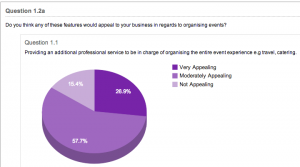
Out of those who are working professionals, 74.9% found the idea of in app purchases appealing.
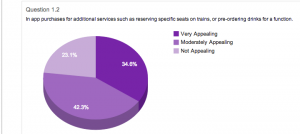
Out of those who are working professionals, 80.8% found the idea of information and offers about group travel appealing.
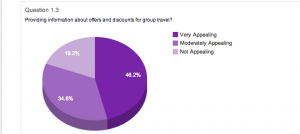
3. Problems with Events
Our results suggests that our participants were much more likely to find themselves unable to invite a friend who isn’t on a social networking site to an event, than risk missing out on an event that is created on a site they aren’t a part of. With only 29.4% saying that they had missed out on an event, compared to 51% saying they’d missed out on inviting a friend to an event because they weren’t part of a social network. Koh.Tu.Me looks to address this issue by making it easy for users to invite people who aren’t part of a social network.
74.5% of participants answered yes to being invited to an event but not knowing who lived close enough to them to share travel costs with. Koh.Tu.Me looks to solve this with our intelligent travel algorithm that links people together based on their proximity and travel preferences.
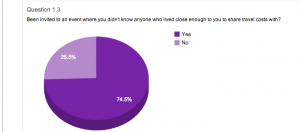
Over half of our participants also answered yes to wearing the incorrect clothing for an event based on not accessing to weather forecast information.
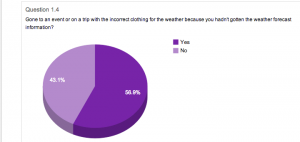
4. Application Features
94.1% of participants said they found the idea of being able to invite people to their events irrespective of whether they are signed up to a social networking site or not appealing.
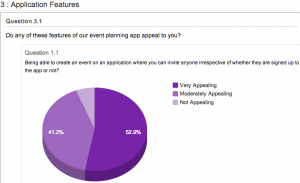
76.5% of participants said that they found the idea of being able to sign in using their facebook/twitter/google+ accounts appealing.
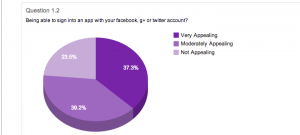
92.2% of participants said they would find receiving travel planning advice about getting from A-B using their desired transport method in addition to saving money appealing.
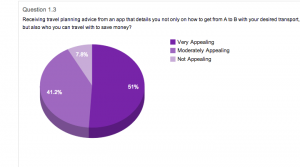
94.2% of participants said that they would find being able to travel in a group to the same place appealing.
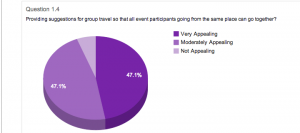
90.2% of participants said that they would find receiving information about the best companies to use to organise travel appealing.
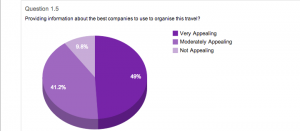
Overall Summary of Results
|
Problem |
% Encountered |
|
Missed out on an event due to it being created on a social network you aren’t a part of. |
29.4% |
|
Missed out inviting a friend to an event as they aren’t part of the social network you created the event on. |
51.0% |
|
Being invited to an event but not knowing who lives near enough to you to share travel with. |
74.5% |
|
Gone to an event wearing the wrong clothing due to not accessing the weather forecast information. |
56.9% |
In regards to the problems Koh.Tu.Me looks to address, not knowing who to travel with to an event is clearly the most recurring problem amongst our participants.
|
Feature |
% Found Appealing |
|
Professional Features |
|
|
Professional service to organise event. |
84.6% |
|
In App Purchases. |
74.9% |
|
Offers & Information about group travelling. |
80.8% |
|
General/Social Features |
|
|
Being able to invite friends to events irrespective of whether they are on a social network or not. |
94.1% |
|
Being able to sign in with Faebook/Twitter/Google+ Accounts. |
76.5% |
|
Receiving travel planning advice about getting from A to B, and money saving advice. |
92.2% |
|
Being able to travel in a group to the same place. |
94.2% |
|
Receiving information about the best companies to use to organise travel. |
90.2% |
For professional features: these results indicate that a high proportion of the working professionals that answered this survey found these elements of Koh.Tu.Me to be appealing, with the most appealing feature being a professional service to take on more responsibility for organising the event overall. For general features: these results indicate that the most popular features center around the inclusive element of Koh.Tu.Me such as being able to invite people to an event irrespective of whether they are on a social network or not, and being able to travel together in a group to events. Encouragingly the results all showed that a much higher proportion of participants found the features of our application appealing as opposed to unappealing.
Graphs generated by: https://www.isurvey.soton.ac.uk/
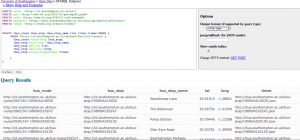
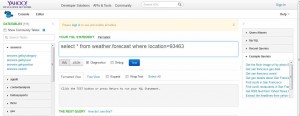
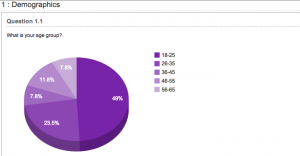
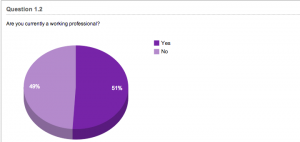
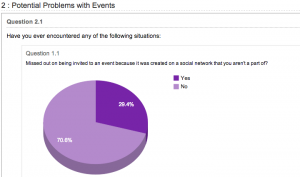
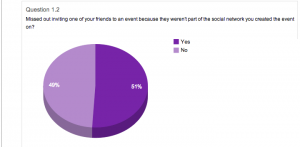
Recent Comments